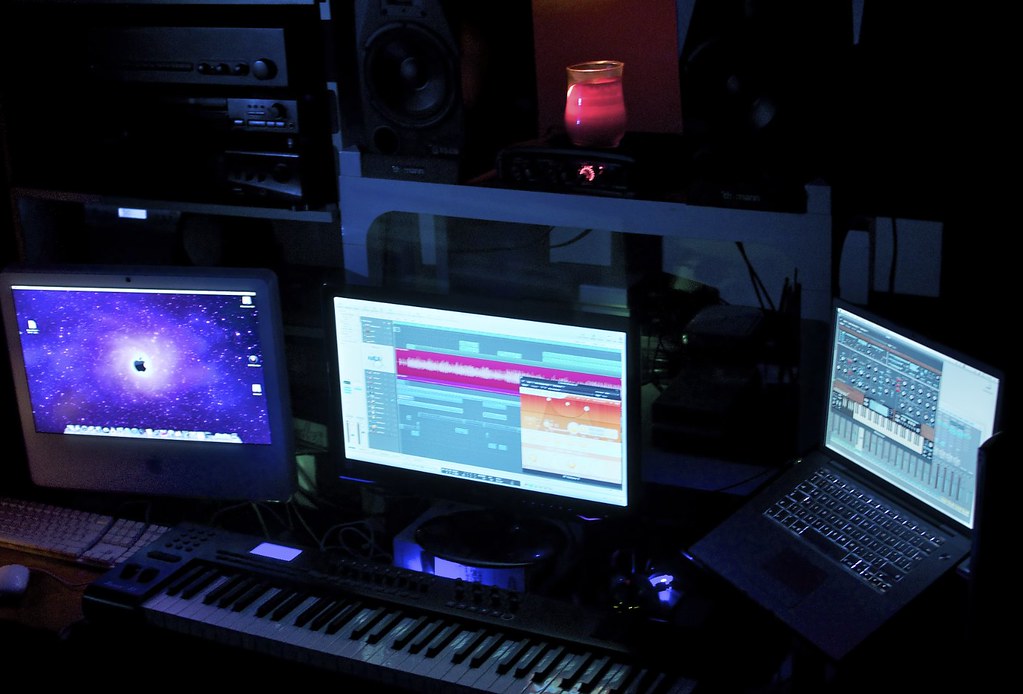An audio editor and mixer, simply called a DAW, is the software used to record, edit, mix, and master music, podcasts, post production projects, and anything else audio-related. The truth is, there’s no “best” DAW—only the one that you know best! Any professional audio editor and mixer can accomplish the same thing, with workflow being the biggest differentiator.
Before picking out the DAW that’s right for you, consider some of the differences between the industry’s most popular options. Price, operating system, or included plugins/virtual instruments are all differentiating factors with today’s top DAWs which will help you narrow down your options.
This is not intended to be a comprehensive list of software, but a short examination of some of the industry’s leading DAWs.
See also: Which DAW is the Best to Use?
See also: Slate Trigger
See also: Kaotica Eyeball Review
Pro Tools
Avid’s Pro Tools is an industry leader. You’d be hard pressed to find any comparison like this which doesn’t mention it. It excels at tracking, editing, and mixing, so it’s obvious why the DAW is considered a gold standard.
At first glance it looks a bit daunting, but then again so does any audio editor and mixer. Once you’ve spent a bit of time with Pro Tools, its power becomes evident. Where it falls short, in many people’s opinions, is in the MIDI sequencing and music production arenas. It just doesn’t cater to quickly building a song in the way some other DAWs do, and the included virtual instruments are limited.
If you’re going to be tracking live audio and mixing all the time, however, Pro Tools is one of the best out there.
Logic Pro X
One of the biggest advantages Logic Pro has is a massive built-in virtual instrument and audio loop library and excellent MIDI capabilities. If you lean more towards the creative side of music production rather than technical, Logic is an obvious choice. It is limited to Mac OS X, though, so if you have a Windows machine you’ll have to look elsewhere.
Logic is a pretty good all-around DAW which leans toward music production and songwriting. The included Drummer instrument for example, which automatically grooves along to your song, is designed to help write music efficiently.
If you’re a producer and songwriter running an Apple machine, consider Logic for your audio needs.
Ableton Live
After its introduction in 2001, Ableton changed the expectation of what a standard DAW could be. Ever since, it’s gained massive popularity amongst electronic and hip hop producers.
Ableton really stands out in its MIDI sequencing. Some platforms are just plain clunky compared to Ableton’s workflow. Depending on which of the packages you choose from, the program comes with up to 70 GB worth of sounds, 13 software instruments, 41 audio effects, and 15 MIDI effects, making it a clear choice for EDM, hip hop, and other electronic-based music production.
FL Studio
Again, FL is a standout choice for electronic and hip hop producers. Its workflow is one of the most unique out there, really lending itself to making beats quickly. Of course, it’s evolved over the years to be a capable audio editor and mixer, though it still shines primarily as a production tool.
If you’re interested in music making, you can’t go wrong here. FL Studio has come a long way from a four-channel drum machine to a full-fledged DAW. Also, it’s worth noting that FL Studio was previously Windows-only, though it has since opened up to Mac users as of FL Studio 20.
For electronic music production, FL Studio is one of the best there is.
Reaper
Often unmentioned in the list of “major” software, Reaper is an inexpensive, fully-functioning DAW. Its efficient 64-bit internal audio processing engine supports media in almost format at any bit depth and sample rate.
Frankly speaking, anything your favorite DAW can do, Reaper can do too! Though it doesn’t come with any of its own virtual instruments, Reaper of course supports plugins and instruments in nearly every format.
Recording, mixing, MIDI’ing, automating, and what have you. It’s all there, and at a price that’s very hard to beat.
Reaper is another great all-around audio editor and mixer.
Cakewalk by BandLab
Last year, BandLab relaunched Cakewalk’s SONAR Platinum DAW as a free download.
According to the company’s press release,
THE REVIVED DAW INCLUDES ALL CORE PREMIUM FEATURES OF SONAR PLATINUM SUCH AS THE AWARD-WINNING SKYLIGHT USER INTERFACE, FLEXIBLE PROCHANNEL MODULES, AND POWERFUL END-TO-END 64-BIT MIX ENGINE.
What really sets Cakewalk apart is that it’s free. Unfortunately, it’s also Windows-only so Mac users will have to look elsewhere. Otherwise, it’s an excellent choice for an all-around DAW.
PreSonus Studio One
PreSonus Studio One 4 is another good choice for music production, offering a complete DAW experience. Sharing in Logic Pro X’s intuitiveness, Studio One keeps the artist in mind; not everyone wants to be an engineer, after all!
Features like “Arranger Track” and “Scratch Pad” allow users to make quick adjustments to arrangement or audition composition changes without committing to them. This makes Studio One great for composers working with dense arrangements.
SEE ALSO: Best Audio Interface for Mac
SEE ALSO: Kilohearts Phase Plant VST Review
SEE ALSO: Aaron Marshall of Intervals Redefines Instrumental Guitar Music
Additionally, Impact XT and SampleOne XT are new virtual instruments in version 4, intended for beat-making and loop-based composition.
Summary
The DAWs mentioned here fall into one of three categories.
- Best for audio tracking, editing, and mixing: Pro Tools
- Best for music production: Ableton, FL Studio, PreSonus Studio One
- Best all-around: Logic Pro X, Cakewalk, Reaper
